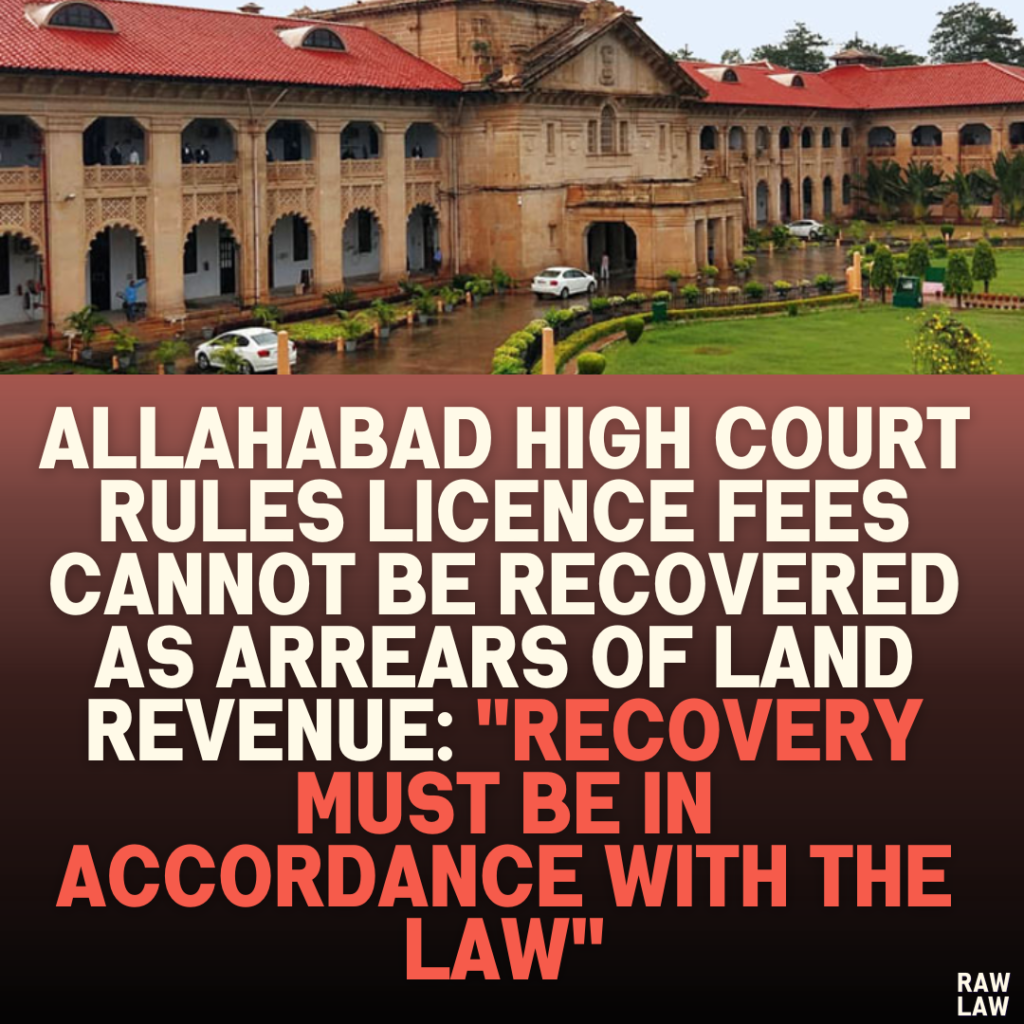Court’s Decision:
The Allahabad High Court quashed the recovery citation dated 05.09.2024, which sought to recover Rs. 2,00,000 in arrears of licence fees as land revenue. It ruled that such contractual dues cannot be recovered under the provisions of the U.P. Kshettra Panchayat and Zila Panchayat Adhiniyam, 1961 (Adhiniyam). The court allowed the Zila Panchayat to pursue recovery by approaching a competent court under Section 158(1) or other lawful remedies.
Facts:
- The petitioner had successfully bid for a tender floated by the Zila Panchayat to collect and dispose of bones and hides of dead animals within a defined block in Lalitpur District for the year 2023-24.
- After the work order was issued, the petitioner deposited the licence fee but faced disruptions from private parties, making it impossible to execute the contract. Complaints to authorities went unaddressed.
- On 12.08.2024, the Zila Panchayat issued a recovery certificate for Rs. 2,00,000. This certificate was forwarded to the District Magistrate for recovery as arrears of land revenue.
- The petitioner challenged the recovery proceedings, arguing that the dues arose from a contractual arrangement and could not be recovered in this manner.
Issues:
- Whether the Zila Panchayat can recover contractual dues (licence fees) as arrears of land revenue under the Adhiniyam, 1961?
- Whether the recovery proceedings initiated by the Zila Panchayat comply with the legal framework for such recoveries?
Petitioner’s Arguments:
- The petitioner contended that licence fees do not qualify as dues recoverable under Section 159 of the Adhiniyam. These are contractual sums, not taxes or rents.
- Recovery of such amounts can only be pursued in a court of competent jurisdiction under Section 158(1).
- The petitioner pointed out that previous rulings of the High Court consistently barred the recovery of contractual dues as arrears of land revenue.
Respondent’s Arguments:
- The Zila Panchayat argued that the recovery was justified under Section 159, which allows recovery of certain dues as arrears of land revenue.
- The citation issued was a lawful demand for public money owed to the Panchayat.
Analysis of the Law:
- Section 159 of the Adhiniyam:
- This provision is limited to the recovery of rent for land managed by the Zila Panchayat. It does not extend to contractual dues like licence fees.
- Section 158 of the Adhiniyam:
- Provides the option to sue in a court for recovery. This is the correct procedure for contractual claims.
- U.P. Revenue Code, 2006:
- Governs the recovery of land revenue and sums declared recoverable as arrears of land revenue. Licence fees do not fall under this category, as they are not specified as such in the Adhiniyam.
Precedent Analysis:
The court referred to several landmark judgments:
- Subhash Chand v. Collector, Etawah:
- Held that contractual dues are not recoverable as arrears of land revenue.
- Titu Singh v. District Magistrate:
- Distinguished between taxes (recoverable as arrears of land revenue) and contractual sums (not recoverable).
- Sanjay Kumar Gupta v. State of U.P.:
- Clarified that licence fees, being contractual dues, are outside the scope of recovery mechanisms meant for taxes or rents.
These precedents consistently restrict the scope of recovery as arrears of land revenue to statutory dues only.
Court’s Reasoning:
- Distinction Between Contractual Dues and Statutory Taxes/Rent:
- The court noted that Section 159 applies solely to arrears of rent for land vested in the Panchayat. Licence fees, being contractual, do not qualify as such.
- Improper Invocation of Section 159:
- The recovery certificate and subsequent citation relied on Section 159, which was inapplicable to licence fees.
- Recovery Process Under Adhiniyam:
- The Adhiniyam provides a mechanism for recovering dues, but it requires resorting to legal proceedings under Section 158, not coercive recovery as arrears of land revenue.
Conclusion:
The court quashed the recovery citation as it was issued without legal backing. However, it permitted the Zila Panchayat to pursue lawful recovery methods, including filing a suit in a competent court under Section 158(1).
Implications:
- Reaffirmation of Legal Boundaries: The judgment emphasizes the distinction between statutory dues and contractual amounts, ensuring that public authorities adhere to proper legal procedures.
- Protection for Contractors: It provides contractors with relief from arbitrary recovery measures, requiring authorities to approach courts for enforcement of contractual obligations.
- Clarification for Zila Panchayats: The ruling guides Panchayats to avoid overreach in their recovery powers, fostering compliance with statutory frameworks.
This detailed reasoning ensures that public money owed to local bodies is recovered lawfully, balancing the interests of contractors and public authorities.
